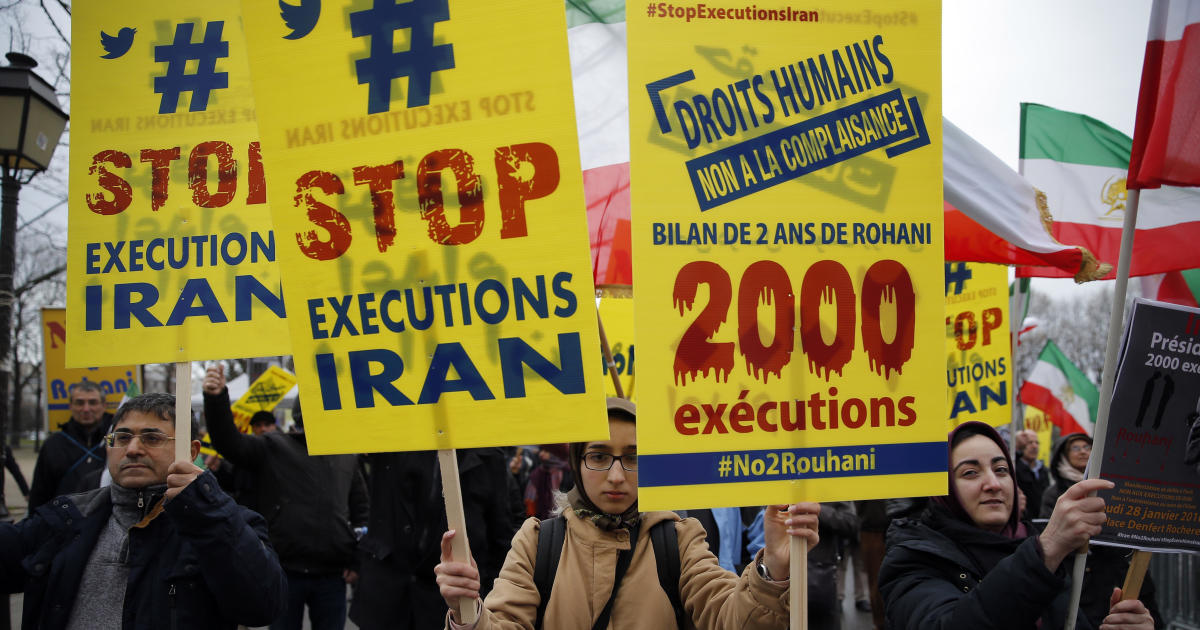Iran’s use of capital punishment has come under increasing scrutiny in recent years, with international organizations and human rights groups highlighting the country’s high execution rate. The recent public execution of two men for the killing of a police officer during an armed robbery underscores the severity of Iran’s application of the death penalty and the ongoing concerns surrounding its human rights record. This practice, although relatively infrequent in Iran, raises fundamental questions about justice, human rights, and the implications of public executions as a form of punishment. The drastic increase in executions, both in public and private, over the past few years is particularly troubling and warrants deeper analysis of the underlying causes and the international implications of such actions.
The Execution and its Context
The public execution of two individuals in Khomein, Iran, for the murder of a police officer during an armed robbery serves as a stark reminder of Iran’s continued use of the death penalty for a wide range of offenses. The judiciary’s announcement, carried via Mizan Online, stated that the execution was carried out in accordance with the law, citing the severity of the crime. However, the act itself raises significant concerns about human rights, due process, and the broader implications of capital punishment, particularly its public nature. This seemingly routine announcement, within the context of Iran’s overall execution rate, further highlights the pervasive nature of capital punishment within the Iranian judicial system.
Public vs. Private Executions
While Iran predominantly carries out executions privately, the public nature of this particular execution is notable. Public executions are viewed by human rights organizations as a form of spectacle, intended to instill fear and control, potentially violating international norms against cruel, inhuman, or degrading treatment or punishment. The limited information available on this specific case prevents a complete analysis of its justifications. But, the choice to carry it out publicly casts a wider shadow on Iranian jurisprudence and its relationship with international human rights standards.
Iran’s High Execution Rate
Iran consistently ranks among the countries with the highest numbers of executions globally, second only to China according to Amnesty International and Human Rights Watch. The reported increase in executions in 2023 represents a disturbing trend. Amnesty International noted that this increase marks the highest figure since 2015, signaling a significant escalation in the state’s use of the death penalty. These statistics, when examined alongside the recent public execution, paint a concerning picture of the Iranian government’s approach to criminal justice and its disregard for international human rights norms and concerns surrounding fair trials and due process.
The Rise in Executions: Causes and Consequences
The reasons behind this alarming upswing in executions in Iran are multifaceted and complex, intertwining with political, social, and economic factors. While there’s no definitive answer, factors such as the ongoing political tension and the government’s seemingly intensified crackdowns on dissent could be playing significant roles. The consequences are far-reaching, extending beyond the immediate victims. It creates an environment of fear and oppression which potentially restricts freedom of expression and discourages open dissent. Internationally, this high rate of executions undermines Iran’s global standing and damages its reputation, resulting in increased international scrutiny.
International Condemnation and Human Rights Concerns
International human rights organizations, such as Amnesty International and Human Rights Watch, consistently condemn Iran’s high execution rate and raise concerns about due process violations in the judicial system. These groups emphasize that Iran’s application of the death penalty frequently contradicts international human rights law, particularly those provisions emphasizing fair trial guarantees, due process, and the prohibition of cruel and unusual punishment. The consistent public outcry further underlines that this isn’t just an internal affair but impacts the global community’s shared vision of fundamental human rights and the international rule of law.
The Role of International Pressure
International pressure remains an important tool in addressing Iran’s human rights abuses. Continued condemnation from international bodies, human rights groups, and individual states exerts some degree of moral and diplomatic pressure on the Iranian government. However, the effectiveness of these measures is often debated, particularly considering Iran’s history of resisting external intervention in its domestic affairs. Nonetheless, maintaining this diplomatic pressure is crucial to holding Iran accountable for its human rights record and pushing for a reduction in its executions, ultimately working towards a more humane and just judicial system.
Implications and Future Outlook
Iran’s persistent reliance on capital punishment, especially at a markedly increased rate, presents considerable challenges to the country’s human rights record and international standing. The future implications could include further international isolation, restrictions on trade and cooperation, and lasting reputational damage. While domestic factors significantly influence Iran’s judicial policies, external pressure and international engagement remain vital for encouraging reform.
A Call for Change
There is an urgent need for constructive dialogue and international cooperation to address the root causes behind Iran’s high execution rate, working towards a reduction in the application of the death penalty and a more comprehensive justice system compliant with international human rights standards. This requires engaging directly with Iranian authorities, utilizing diplomacy, engaging civil society groups within Iran, and increasing public awareness. The journey toward reform will undoubtedly be long and challenging, but upholding international human rights principles should remain a priority.
Takeaway Points:
- Iran’s recent public execution highlights its continued reliance on capital punishment and its alarmingly high execution rate.
- The increase in executions, particularly in 2023, raises concerns about human rights violations and due process.
- International organizations and human rights groups strongly condemn Iran’s use of the death penalty and call for reform.
- Continued international pressure and engagement are crucial for encouraging positive change in Iran’s judicial system.









